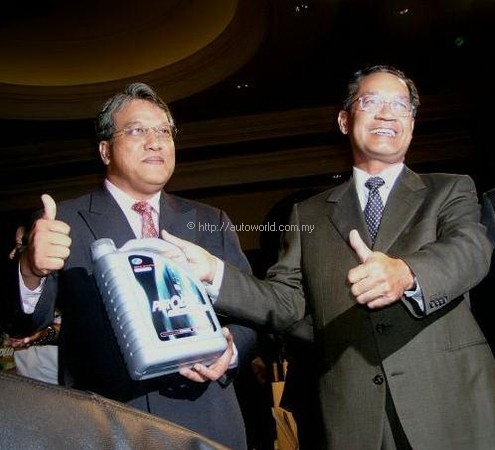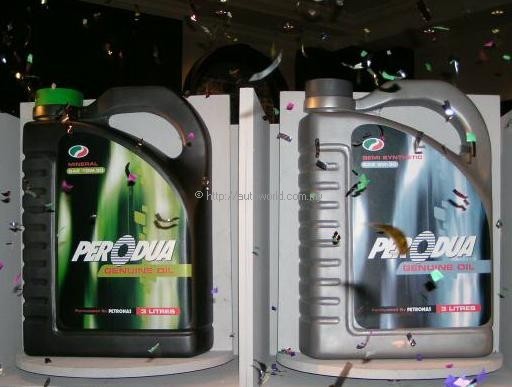Perodua Genuine Oil
In a move which reflects Perodua’s evolution as a full-fledged carmaker, the company today introduced Perodua Genuine Oil (PGO) which has a unique formulation developed in collaboration with Petronas. PGO takes over from the M-TEC lubricants which were developed by Castrol Malaysia specially for Perodua models when the original Kancil was launched in 1994.
According to Zainuddin Bahaudin, Executive Director of Perodua Sales Sdn Bhd, the contract with Castrol Malaysia had expired and as a new generation of engines (such as the DOHC 12-valve EFI powerplant in the latest Kenari and Kelisa) is now in use, engine oil requirements had also to be upgraded. Perodua invited a number of oil companies to tender for the 8-year supply contract and Petronas (through its Lub Dagangan Sdn Bhd unit) offered the best package and it had nothing to do with any ‘obligation’ by one national company to work with another national company.
“It was more than just formulating a new oil to our specifications, but also other aspects such as technical support, future product development, marketing activities, workshop equipment and even motorsports involvement,” Encik Zainuddin revealed, adding that the Perodua plant near Rawang, Selangor, also has an ongoing relationship with Petronas and uses its engine oil for the first fill.
While the technology for PGO may come from the 20 years of experience that Petronas has in the field – which includes its involvement in Formula 1 and rallying – the formulation is unique and not just Petronas Syntium or Mach 5 oils in a PGO container. Petronas had to come up with a formulation which could meet the DTS K1500G standard which is a tough in-house service standard established by Daihatsu, Perodua’s technical partner and shareholder.
The DTS K1500G standard is specifically designed for smaller engines such as the 3-cylinder engines which are used in the majority of Perodua cars. According to a Petronas engineer, this standard is more important and relevant to Perodua engines than the better-known API (American Petroleum Institute) standards because of the emphasis on performance in small engines. Unsaid is the fact that it costs a lot of money for the licensing fee to make use of the API classification…
“The API standards are high and the tests are also tough but you should understand that as they are influenced by the American industry, they are often based on larger engines which have different characteristics from small engines. Therefore, it is good that Perodua has decided to adopt an in-house standard for its lubricants which are much more relevant to its type of engines,” the engineer told AUTOWORLD.COM.MY.
“In other words, while you can still use any oil with an API standard and the correct viscosity for the engine, you are not likely to get optimized performance as you would with an oil that has been formulated to standards that are set by the same company which designed the engine,” he added.
Perodua’s adoption of the Daihatsu standard is logical since Daihatsu is its technical partner and the Japanese automaker has a lot more experience in such things. However, extensive testing has also been carried out on the PGO formulation in local conditions to ensure it is the best oil for Perodua owners to use.
“We have tested PGO in our own Malaysian-made engines and done road tests in various Malaysian driving conditions so we are positive that it delivers the highest level of performance in our vehicles,” confirmed Tuan Haji Ibrahim bin Maidin, Perodua’s GM of Sales & Parts Operations.
Because the engines are small, minimizing internal friction is extremely important. However, a more important element in the specification of PGO is the omission of magnesium additives, which are usually used for detergency functions in the oil. The problem is that magnesium turns into ash during the combustion process and some of it stays on the piston ring areas, affecting the engine performance. So an alternative additive to magnesium has been used and according to a Petronas source, this alternative is calcium and costs a bit more.
It is this particular feature of PGO (which was also in the M-TEC oil) which gives Perodua reason to insist on customers using only its oil, failing which they could have their warranty invalidated.
“Many people assume that we insist on Perodua owners using our oil for ‘business reasons’ but actually, it is because our oil has a formulation which is unique and will give the best performance for Perodua engines. Furthermore, since Petronas is our official supplier and business partner, we have the confidence that any issues concerning oil quality or oil-related problems with the engine can be looked into whereas we would not be able to do anything if the oil the customer uses is by some other party with no association with Perodua,” explained Perodua’s Tuan Haji Ibrahim.
The other features of PGO are typical of any high-quality engine oil but the DTS K1500G standard is quite stringent on oxidation stability at high operating temperatures, seal compatibility and low phosphorus content. There’s also an advanced additive package which offers good sludge and deposit control so that the engine stays cleaner longer and oil filter clogging is prevented. It also resists high temperature breakdown, oil thickening, corrosion and rust, thus extending oil service life.
The formulation of PGO is so unique that Petronas engineers stress that motorists should not use any other additives as these could upset the carefully-balanced ‘recipe’. It is possible that some additives may even contain magnesium, the very thing that is kept out of PGO.
Good fluidity is important for fast oil circulation, especially in cold starts and quicker acceleration and better fuel economy (less ‘drag’ from the oil), so the viscosities for PGO have been carefully chosen to ensure this.
Understanding that there are different types of owners and a demand for choices, Perodua offers two grades of PGO – SAE 5W/30 (silver pack) which is a semi-synthetic blend and SAE 10W/30 (green pack) which is a mineral-based oil. A full-synthetic PGO is presently under development and will be available in future. Oil change intervals remain at 5,000 kms, which Perodua feels is better for local motoring conditions.
PGO, which can also be used in the Rusa and Kembara DVVT, is only available at all 117 Perodua service centres and authorised service dealers nationwide. At this time, Petronas is not thinking of offering the same product at its own retail outlets. Incidentally, the PGO project is significant for the national oil corporation because it is the first time that they have been commissioned to develop an exclusive formulation for an automaker to use as a Genuine Oil.
PERODUA GENUINE OIL PRICES (P. Malaysia/E. Malaysia)
SAE 10W/30 Mineral-Based
4 litres – RM39.50/RM42.30
3 litres – RM31.00/RM33.10
1 litre – RM13.00/RM13.50
SAE 5W/30 Semi-Synthetic Blend
4 litres – RM65.00/RM68.00
3 litres – RM51.00/RM54.00
1 litre – RM19.00/RM19.50


























